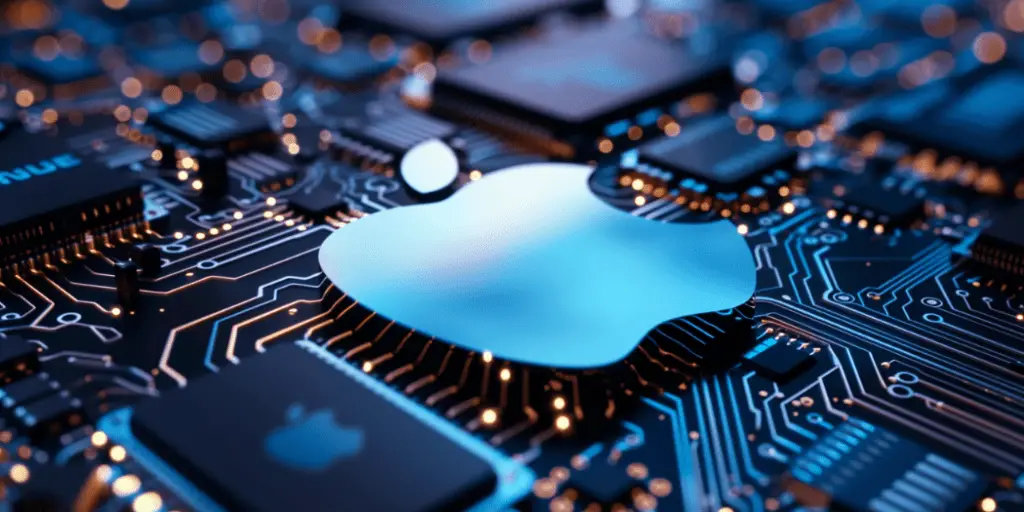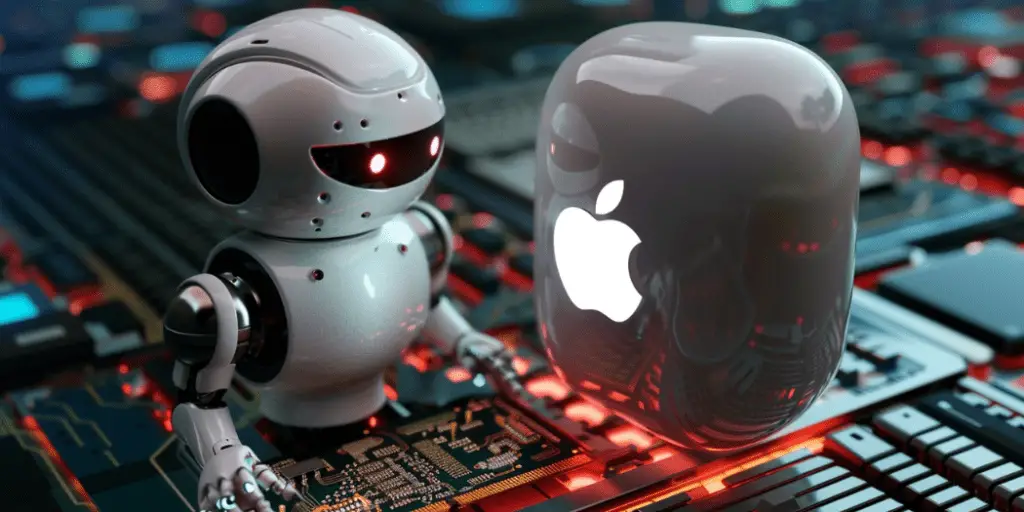Apple developing its own AI chips specifically designed for data centres. According to a recent report from The Wall Street Journal, this initiative, dubbed ‘Project ACDC‘, signifies a significant shift as Apple first aims to integrate these chips within its own server infrastructure.
This development reflects Apple’s focus on advancing AI technology. Also, they are trying to position it to redefine its role in the tech ecosystem, particularly in how AI software is deployed and utilized across global data centres.
Apple Own AI Chips will be highlighted at the upcoming WWDC, where further details are expected to be Released.
Apple Own AI Chips
Apple Inc. has consistently emphasized innovation in its product development, especially in integrating hardware and software.
This approach has given Apple a distinctive edge in the consumer electronics market, with its in-house chips driving performance in iPhones, iPads, and Macs.
The development of these proprietary chips has been a cornerstone of Apple’s strategy. They enable optimized performance and enhanced features that are closely tailored to its operating system and applications.
With the evolution of artificial intelligence technology, Apple has been somewhat cautious in its public rollout compared to its peers.
The company has integrated AI, mainly in the form of machine learning, across its devices to improve user experience subtly—for example, enhancing photography with computational techniques or optimizing battery life through smart usage patterns.
The AI landscape is shifting rapidly, necessitating a more aggressive approach in the domain of generative AI, which powers advanced chatbots and other innovative tools. Recognizing this, Apple has made significant investments to stay competitive.
This includes developing new AI-driven features designed to proactively assist users in their daily lives, a strategic pivot that signals Apple’s recognition of AI’s potential beyond mere background enhancements.

The initiative to develop its own AI chips for data centres, known as ‘Project ACDC’, represents a deeper foray into the operational backbone of AI technology.
Apple aims to reduce its dependence on third-party suppliers and gain greater control over integrating hardware and software in its AI offerings. They are creating chips specifically for running AI algorithms efficiently at scale.
This move aligns with Apple’s long-standing philosophy of seamless integration across its product suite, ensuring the company can offer distinctive, privacy-centric AI solutions that differentiate it from competitors.
Project ACDC
Project ACDC stands for “Apple Chips in Data Centre,” marking Apple’s foray into developing proprietary AI chips explicitly designed for data centre usage.
This project represents a significant step in Apple’s strategy to consolidate and enhance its infrastructure capabilities, particularly in handling large-scale AI computations.
The primary goal of Project ACDC is to empower Apple’s data centres with custom-made AI Chips optimized for running advanced AI software.
This initiative aims to boost the efficiency and performance of AI tasks processed within Apple’s servers.
By leveraging these indigenous chips, Apple intends to enhance AI applications’ speed, scalability, and privacy, aligning with its broader commitment to user privacy and data security.
Apple plans to deploy these AI chips within its own data centre infrastructure. This internal roll-out strategy will allow Apple to thoroughly test and refine the chip’s capabilities in a controlled environment.
Apple can directly monitor and optimize the technology according to real-world operational demands by using its own servers as the first platform for these chips.
While the specific technical details of the chips are not extensively publicized, it’s anticipated that they will integrate seamlessly with Apple’s existing server architectures.
The AI Chips are likely designed to work with Apple’s neural engines and other silicon innovations, previously used to accelerate machine learning tasks on consumer devices like iPhones and iPads.

The development of Project ACDC could have profound implications for how Apple manages its data processing needs, particularly in areas requiring intensive computational power, such as training machine learning models or handling complex generative AI tasks.
With its AI chips, Apple could significantly reduce its reliance on external cloud services and hardware suppliers, leading to greater autonomy and possibly reduced operational costs.
As Apple continues to develop Project ACDC, the tech community and industry analysts eagerly anticipate more detailed announcements, possibly at the upcoming Worldwide Developers Conference.
Comparative Industry
Companies like Microsoft, Google, Meta, and OpenAI are not only players in the AI space but have also developed or developed custom hardware to optimize AI operations.
Microsoft has invested heavily in integrating AI into its cloud services through Azure, deploying custom hardware like the Project Brainwave FPGA chips.
These chips are designed to accelerate AI workloads directly from the cloud, providing customers with highly efficient AI processing capabilities.
Microsoft’s deep involvement in AI also extends to its partnership with OpenAI. The company leverages powerful AI models like GPT for its products and services.
Google has been focusing on developing AI-specific chips called Tensor Processing Units.
These TPUs are tailored to accelerate machine learning workflows and are integral to Google Cloud’s AI services.
Google’s AI-first approach has permeated its entire suite of products, enhancing services like Google Search, Google Photos, and voice assistant technology, all of which benefit from accelerated AI processing.
Meta has developed its own AI hardware to support large-scale training and inference for its AI models.
These efforts are part of a broader initiative to create immersive virtual experiences in the metaverse, where AI plays a crucial role in rendering realistic interactions.
Meta’s focus on virtual and augmented reality technologies further necessitates robust AI processing capabilities.
While primarily a software and research company, OpenAI’s work heavily depends on custom hardware configurations optimized for training and deploying sophisticated AI models, such as ChatGPT.
Partnerships with Microsoft provide OpenAI access to cutting-edge infrastructure, illustrating the symbiotic relationships that can enhance AI development.
In this case, Apple’s AI chip development for data centres is part of a broader strategy of integrating hardware and software, a hallmark of its product philosophy.
Apple’s approach often focuses on user privacy and data security, which are critically important in the deployment of AI solutions.
Final Thoughts
Apple’s Project ACDC represents a pivot that could significantly influence the company’s technological trajectory and competitive stance in the global tech industry.
They are trying to integrate AI chips designed in-house, and Apple is set to enhance its AI operations’ performance, efficiency, and security.
This decision aims to reduce dependence on external suppliers and cloud services and enhance Apple’s data privacy assurances—a critical aspect in today’s data-sensitive environment.
The financial implications are equally significant, with potential cost savings, increased revenue opportunities, and improved stock market performance.
The development of Project ACDC positions Apple to potentially redefine industry standards for integrating AI technology across devices and services.
This could lead to new user experiences, more robust AI applications, and even new business models that could expand Apple’s market reach.


